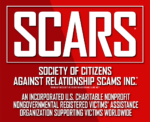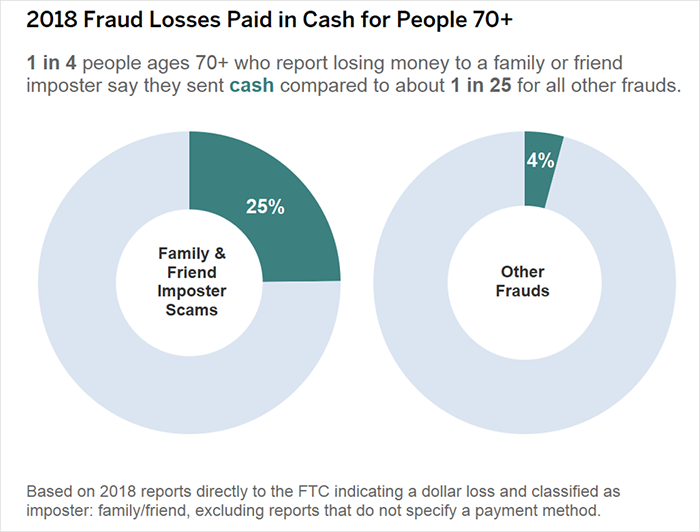
SCARS Institute’s Encyclopedia of Scams™ Published Continuously for 25 Years

SCARS™ Guide: Grandparents Scams
Those Are Not Your Grandchildren! FTC Warns Of New Scam
Grandchildren imposters are managing to finagle a skyrocketing amount of money out of people, the Federal Trade Commission (FTC) warned on Monday.
The FTC says that its Consumer Sentinel Network has noticed a “striking” increase in the median dollar amount that people 70 and older report losing to fraud. When they started to peel back the layers, the Commission found a number of stories that involve people of that age group having mailed “huge” amounts of cash to people who pretended to be their grandchildren.
People from all age groups report having fallen for phony family and friends: the reported median loss for individuals is about $2,000, which is more than four times the median loss of $462 reported for all fraud types.
But that’s nothing compared with how much money is being bled out of the elderly: those who send cash reported median losses of a whopping $9,000. About one in four of the ripped-off elderly who report that they lost money to a family or friend imposter say that they sent cash: a far higher rate than the 1 in 25 of people who sent cash for all other frauds.
CBS News talked to one man who got scammed in a way that the FTC says is a common ploy.
Slick Scam Scripts
It started with a phone call one morning in April, Franc Stratton told the station. The caller pretended to be a public defender from Austin, Texas, who was calling to tell Stratton that his grandson had been in a car wreck, had been driving under the influence, and was now in jail.
Don’t be afraid, the imposter told Stratton: you can bail out your grandson by sending $8,500 in cash via FedEx. It didn’t raise flags for a good reason: Stratton had done exactly that for another family member in the past.
The cherry on top: the “attorney” briefly put Stratton’s “grandson” on the phone. The fake kid sounded injured, so Stratton drove to the bank to get the cash.
“I wrote a check out, and they gave me $8,500 cash in hundreds.”
Stratton went so far as to go to a local FedEx to overnight the money to an Austin address. But later that night, he said, he and his wife looked at each other and said “Scam!”
Fortunately, they came to their senses in time to call FedEx to have the package returned. He got his money back, but Stratton is still frustrated. Of all people, he should know better, he says: he’s retired now after a career spent working in intelligence, first for the Air Force and later as a cybersecurity programmer.
That’s how slick the scammers are, with their meticulously prepared scripts, and it shows that they know exactly how to put people into a panicked state, where they’re likely to make bad decisions. Stratton said he fell for it “because of the way that they scripted it.”
“I’m the last person, I thought, would ever fall for a scam like this.”
The FTC’s Monica Vaca says:
“A lot of people think they won’t fall for it and a lot of people don’t fall for it. But the fact of the matter is that when you get one of these calls, they sound really real. Scammers are very, very good at making you believe that you’ve got an emergency situation on your hands and they have a really powerful way of getting you to act on that.”
The FTC says that Americans have lost $41 million in the scam this year: nearly twice as much as the $26 million loss the year before.
Self-defense for grandparents
These scams are growing more sophisticated as fraudsters do their homework, looking at you and/or your grandkids up on social media to lace their scripts with personal details that make them all the more convincing.
Grandparents, no matter how savvy you are, you’ve got an Achilles heel: your love for your grandchildren. The fakers know exactly how to milk that for all it’s worth.
The FTC warns that they’ll pressure you into sending money before you’ve had time to think it through. The Commission offers this advice to keep the shysters from wringing your heart and your wallet:
- Stop. Breathe. Check it out before you send a dime. Look up your grandkid’s phone number yourself, or call another family member.
- Don’t overshare. Whatever you share publicly on social media becomes a weapon in the arsenals of scammers. The more personal details they know about you, the more convincing they can sound. It’s one of many reasons to be careful about what you share on social media.
- Pass the information on to a friend. Even if you haven’t been targeted yourself, you probably know somebody who’s either already gotten a call like this or who will.
- Report it. The FTC asks us all to please report these scams. US residents can do so online to the FTC. If you’re in the UK, report scams to ActionFraud.
Please do report these scams. Doing so helps the authorities nail these imposters before they can victimize others. See below for how to best report scams!
United States Federal Trade Commission Guidance On Grandparent Scams
New twist to grandparent scam: mail cash
$9,000
Median individual losses
In 2018, the Consumer Sentinel Network has seen a striking increase in the median dollar amount that people 70 and over are saying they lost to fraud. Digging into the data, we found some common stories with an unusual twist: people 70 and older report mailing huge amounts of cash to people who pretended to be their grandchildren.
People 70 and over rarely report to the FTC that they paid a scammer with cash. But for one particular type of fraud – family and friend imposters – fully 25% of people 70 and over who reported to the FTC how they paid money told us they sent cash.
We call these family and friend imposter scams, but you may know them as the “grandparent scam” and with good reason. People 70 and over report that the scammer posed as a grandchild, usually a grandson, about 70% of the time.
People from all age groups reported median individual losses of about $2,000 to family and friend imposters – far higher than the median loss of $462 reported to us this year for all fraud types. But the story is much worse for people 70 and over who sent cash – they reported median individual losses of $9,000.
When we looked at fraud reports from all age groups, and from all Sentinel data contributors, we found that aggregate losses to family and friend imposters have increased. Losses over the past year reached $41 million, as compared to $26 million in the previous year.
Like many scams, these start with a phone call using some common ploys. In about half of the reports of cash payments, people said the caller claimed to be in jail or other legal trouble. About a third of these reports mentioned a so-called car accident (some mentioning texting or drinking while driving). In both cases, the callers play on people’s emotions and sense of loyalty: they may be told they’re the only person trusted enough to call for help, and they’re often told not to tell anyone.
These scammers are experts at impersonating people they’ve never even met. Car accident injuries, often broken noses, or uncontrolled sobbing explain away a voice that might not sound quite right. Scammers use personal details from social media sites to make their stories more believable. Or they may simply wait for their target to use a name – “Steve, is that you?” – and take the cue.
According to reports, callers often give very specific instructions about how to send cash. Many people said they were told to divide the bills into envelopes and place them between the pages of a magazine. Then, according to reports, they were told to send them using various carriers, including UPS, FedEx, and the U.S. Postal Service.
What can you do about these scams? Talk about them. Many people have gotten these calls, so help others know what to do to spot and avoid the scam:
- Don’t act right away, no matter how dramatic the story is.
- Call that family member or friend, and make sure you use a phone number that you know is right. Or check it out with someone else in your circle, even if the caller told you to keep it a secret.
- Be careful about what you post on social media. If your personal details are public, someone can use them to defraud you and people who care about you.
If you’ve mailed cash, report it right away to the Postal Service or whichever shipping company you used. Some people have been able to stop delivery by acting quickly and giving a tracking number. Also, tell the FTC at FTC.gov/complaint. Learn more about this and other imposter scams at FTC.gov/imposters.
To download a copy of the FTC Spotlight on Grandparent scams Click Here »

SCARS™ Team
A SCARS Division
Miami Florida U.S.A.
END
– – –
Tell us about your experiences with Romance Scammers in our Scams Discussion Forum on Facebook »
– – –
FAQ: How Do You Properly Report Scammers?
It is essential that law enforcement knows about scams & scammers, even though there is nothing (in most cases) that they can do.
Always report scams involving money lost or where you received money to:
- Local Police – ask them to take an “informational” police report – say you need it for your insurance
- Your National Police or FBI (www.IC3.gov)
- The SCARS|CDN™ Cybercriminal Data Network – Worldwide Reporting Network HERE or on www.Anyscam.com
This helps your government understand the problem, and allows law enforcement to add scammers on watch lists worldwide.
– – –
Visit our NEW Main SCARS Facebook page for much more information about scams and online crime: www.facebook.com/SCARS.News.And.Information
To learn more about SCARS visit www.AgainstScams.org
Please be sure to report all scammers HERE or on www.Anyscam.com
All original content is Copyright © 1991 – 2018 SCARS All Rights Reserved Worldwide & Webwide – RSN/Romance Scams Now & SCARS/Society of Citizens Against Relationship Scams are all trademarks of Society of Citizens Against Relationship Scams Incorporated (formerly the Society of Citizens Against Romance Scams)
Legal Notices:
All original content is Copyright © 1991 – 2018 SCARS All Rights Reserved Worldwide & Webwide. Third-party copyrights acknowledge.
SCARS, RSN, Romance Scams Now, SCARS|GLOBAL, SCARS, Society of Citizens Against Relationship Scams, Society of Citizens Against Romance Scams, SCARS|ANYSCAM, Project Anyscam, Anyscam, SCARS|GOFCH, GOFCH, SCARS|CHINA, SCARS|CDN, SCARS Cybercriminal Data Network, Cobalt Alert, Scam Victims Support Group, are all trademarks of Society of Citizens Against Relationship Scams Incorporated.
Contact the law firm for the Society of Citizens Against Relationship Scams Incorporated by email at legal@AgainstScams.org
-/ 30 /-
What do you think about this?
Please share your thoughts in a comment below!
Table of Contents
- Those Are Not Your Grandchildren! FTC Warns Of New Scam
- Slick Scam Scripts
- United States Federal Trade Commission Guidance On Grandparent Scams
- $9,000
Median individual losses - Tell us about your experiences with Romance Scammers in our Scams Discussion Forum on Facebook »
- Please be sure to report all scammers HERE or on www.Anyscam.com
LEAVE A COMMENT?
Recent Comments
On Other Articles
- velma faile on Finally Tax Relief for American Scam Victims is on the Horizon – 2026: “I just did my taxes for 2025 my tax account said so far for romances scam we cd not take…” Feb 25, 19:50
- on Reporting Scams & Interacting With The Police – A Scam Victim’s Checklist [VIDEO]: “Yes, this is a scam. For your own sanity, just block them completely.” Feb 25, 15:37
- on Danielle Delaunay/Danielle Genevieve – Stolen Identity/Stolen Photos – Impersonation Victim UPDATED 2024: “She goes by the name of Sanrda John now” Feb 25, 10:26
- on Reporting Scams & Interacting With The Police – A Scam Victim’s Checklist [VIDEO]: “So far I have not been scam out of any money because I was aware not to give the money…” Feb 25, 07:46
- on Love Bombing And How Romance Scam Victims Are Forced To Feel: “I was love bombed to the point that I would do just about anything for the scammer(s). I was told…” Feb 11, 14:24
- on Dani Daniels (Kira Lee Orsag): Another Scammer’s Favorite: “You provide a valuable service! I wish more people knew about it!” Feb 10, 15:05
- on Danielle Delaunay/Danielle Genevieve – Stolen Identity/Stolen Photos – Impersonation Victim UPDATED 2024: “We highly recommend that you simply turn away form the scam and scammers, and focus on the development of a…” Feb 4, 19:47
- on The Art Of Deception: The Fundamental Principals Of Successful Deceptions – 2024: “I experienced many of the deceptive tactics that romance scammers use. I was told various stories of hardship and why…” Feb 4, 15:27
- on Danielle Delaunay/Danielle Genevieve – Stolen Identity/Stolen Photos – Impersonation Victim UPDATED 2024: “Yes, I’m in that exact situation also. “Danielle” has seriously scammed me for 3 years now. “She” (he) doesn’t know…” Feb 4, 14:58
- on An Essay on Justice and Money Recovery – 2026: “you are so right I accidentally clicked on online justice I signed an agreement for 12k upfront but cd only…” Feb 3, 08:16
ARTICLE META
Important Information for New Scam Victims
- Please visit www.ScamVictimsSupport.org – a SCARS Website for New Scam Victims & Sextortion Victims
- Enroll in FREE SCARS Scam Survivor’s School now at www.SCARSeducation.org
- Please visit www.ScamPsychology.org – to more fully understand the psychological concepts involved in scams and scam victim recovery
If you are looking for local trauma counselors please visit counseling.AgainstScams.org or join SCARS for our counseling/therapy benefit: membership.AgainstScams.org
If you need to speak with someone now, you can dial 988 or find phone numbers for crisis hotlines all around the world here: www.opencounseling.com/suicide-hotlines
A Note About Labeling!
We often use the term ‘scam victim’ in our articles, but this is a convenience to help those searching for information in search engines like Google. It is just a convenience and has no deeper meaning. If you have come through such an experience, YOU are a Survivor! It was not your fault. You are not alone! Axios!
A Question of Trust
At the SCARS Institute, we invite you to do your own research on the topics we speak about and publish, Our team investigates the subject being discussed, especially when it comes to understanding the scam victims-survivors experience. You can do Google searches but in many cases, you will have to wade through scientific papers and studies. However, remember that biases and perspectives matter and influence the outcome. Regardless, we encourage you to explore these topics as thoroughly as you can for your own awareness.
Statement About Victim Blaming
SCARS Institute articles examine different aspects of the scam victim experience, as well as those who may have been secondary victims. This work focuses on understanding victimization through the science of victimology, including common psychological and behavioral responses. The purpose is to help victims and survivors understand why these crimes occurred, reduce shame and self-blame, strengthen recovery programs and victim opportunities, and lower the risk of future victimization.
At times, these discussions may sound uncomfortable, overwhelming, or may be mistaken for blame. They are not. Scam victims are never blamed. Our goal is to explain the mechanisms of deception and the human responses that scammers exploit, and the processes that occur after the scam ends, so victims can better understand what happened to them and why it felt convincing at the time, and what the path looks like going forward.
Articles that address the psychology, neurology, physiology, and other characteristics of scams and the victim experience recognize that all people share cognitive and emotional traits that can be manipulated under the right conditions. These characteristics are not flaws. They are normal human functions that criminals deliberately exploit. Victims typically have little awareness of these mechanisms while a scam is unfolding and a very limited ability to control them. Awareness often comes only after the harm has occurred.
By explaining these processes, these articles help victims make sense of their experiences, understand common post-scam reactions, and identify ways to protect themselves moving forward. This knowledge supports recovery by replacing confusion and self-blame with clarity, context, and self-compassion.
Additional educational material on these topics is available at ScamPsychology.org – ScamsNOW.com and other SCARS Institute websites.
Psychology Disclaimer:
All articles about psychology and the human brain on this website are for information & education only
The information provided in this article is intended for educational and self-help purposes only and should not be construed as a substitute for professional therapy or counseling.
While any self-help techniques outlined herein may be beneficial for scam victims seeking to recover from their experience and move towards recovery, it is important to consult with a qualified mental health professional before initiating any course of action. Each individual’s experience and needs are unique, and what works for one person may not be suitable for another.
Additionally, any approach may not be appropriate for individuals with certain pre-existing mental health conditions or trauma histories. It is advisable to seek guidance from a licensed therapist or counselor who can provide personalized support, guidance, and treatment tailored to your specific needs.
If you are experiencing significant distress or emotional difficulties related to a scam or other traumatic event, please consult your doctor or mental health provider for appropriate care and support.
Also read our SCARS Institute Statement about Professional Care for Scam Victims – click here to go to our ScamsNOW.com website.



















Thank you for your comment. You may receive an email to follow up. We never share your data with marketers.